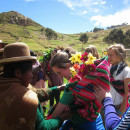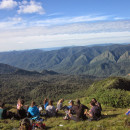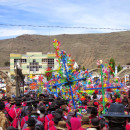Through New Eyes: Cultural Beauty and Global Issues in Bolivia Past Review
By Emma S (Psychology, Spanish, Denison University) - abroad from 02/04/2015 to 05/19/2015 with
SIT Study Abroad: Bolivia - Multiculturalism, Globalization, and Social Change
I learned so much about the social movements and social issues, both past and present, that are both unique to Bolivia's complex and interesting history and also can apply to many of the global issues we face today. I gained confidence in my ability to speak another language, navigate an unfamiliar place by myself, tackle challenges and face discomfort, grapple with intense and complicated questions about identity and global crises. I learned about a place in the world that I probably never would've been connected to without SIT Bolivia.
Review Photos



Personal Information
| How much international exposure did you have prior to this program? | 1 month - 6 months |
Review Your Program
|
* Overall educational experience
Academic rigor, intensity, resources, etc. |
The program is well-balanced in terms of work-load and getting to learn through experiences outside of reading articles or writing essays. The academic assignments are meaningful and worthwhile. Many of the powerful and memorable learning periods come from traveling with the group when the classes go on the road during excursions. |
|
* Host Country Program Administration
On-site administration of your program |
The program staff are amazing. They are extremely loving and are always making sure students are safe and happy. There is an SIT program family in-country and they have incredible connections all around Bolivia. The administration of the program is always concerned about safety, student well-being, and making the experience as powerful as it can be, and making an effort to get to know the students. |
|
* Housing:
How satisfied were you with your living arrangements? |
I loved my host family!!! They were definitely one of the best parts of the overall experience for me. By the end I really felt like a part of their family and I keep the memories of my time with them close to my heart. SIT staff in Bolivia know how to choose families and make sure students have a good family experience. |
| * Food: |
There is good food and some not-so-good food. Food is definitely not the highlight during rural community stays for example and there were days during homestays that I wasn't the biggest fan but once you get in the routine of some of the staple foods such as fried chicken with rice in the cities and lots and lots of potatoes everywhere you grow to appreciate food there. |
|
* Social & Cultural Integration:
How integrated did you feel with the local culture? |
I found being a white female challenging in a society that, like many latin american countries is known to be "machista", but in terms of the program and my host family and many people I met along the way I felt extremely welcomed and especially when my Spanish improved I felt like I had a life there. In terms of cultural immersion, the program does this very well. Through classes, excursions, living with a family, etc, I felt like I really learned a lot about the country and culture. There's a huge difference between being a tourist and living there as a student and SIT really captures this and makes sure we experience the latter. I would say to any female (especially light-skinned females) planning to any country where "machismo" dominates, to be aware of this challenge before you go. In many ways for my peers in our group discussions it brought up a lot of meaningful and difficult issues in regards to negotiating identity and being a foreigner and what it means to come from the U.S. |
|
* Health Care:
How well were health issues addressed during the program? |
During orientation the program makes it a point to be very upfront and serious about the health concerns they've faced in the past. Bolivia's water system is especially bad and it's easy to get sick from food contamination if not careful. The staff make sure students know how to be careful and avoid illness. During my semester, nothing serious came up, just typical viruses and bacteria from water. The program staff is always ready to help and get us the medical attention we might need. During excursions we traveled as a group and knew we could get medical attention in case of emergency. Yellow Fever vaccine is required in order to enter the country and Typhoid is strongly recommended. We did not go into any malaria regions so no one took any medication for that. |
| * Safety: |
Like most places in Latin America, safety is a concern. During my program there were never any issues. I felt very safe with my host family and when traveling with the program for classes. There is always slight risk being a female foreigner and precautions should be taken to avoid money or items being stolen and in regards to taxi rides. The program goes over safety info in detail and I never had any problems but I always made a conscious effort to be extra careful and aware about safety issues. |
| If you could do it all over again would you choose the same program? |
Yes
|
Finances
|
* Money: How easily were you able to live on a student's budget?
(1 = not very easy/$200+ on food & personal expenses/week, 2.5 = $100/week, 5 = very easily/minimal cost) |
Very easy to live on a student budget. U.S. dollars go a long way in Bolivia and because the program cost covers host family expenses and traveling during the program, there really is very little need for money apart from bus/taxi fare, snacks, coffee, gifts, or item from a market... |
| Not including program expenses, about how much money did you spend on food and other expenses each week? | less than $40 |
| Do you have any general money-saving tips for future study abroad participants? | Even though the advantageous conversion rate can make it easy to buy things, be aware of how often you spend money on something just because you think it would cost less in the U.S. |
Language
| * Did your program have a foreign language component? | Yes |
| How would you rate your language skills at the beginning of the program? | Intermediate |
| How would you rate your language skills at the end of the program? | Advanced |
| What was the highest level language course you had completed prior to departure? | I had taken upper level college courses for my Spanish minor |
| How many hours per day did you use the language? | |
| Do you have any tips/advice on the best ways to practice the language for future study abroad participants? | Knowing how to conjugate verbs is probably the best way to prepare, but really the skill of being able to converse in Spanish comes from being in the country and speaking everyday with your host family and with the teachers/staff. But knowing grammar does help give you skills that will make you learn faster when you arrive to the country. |
Other Program Information
|
* Where did you live?
Select all that apply |
|
|
* Who did you live with?
Select all that apply |
|
|
* Who did you take classes with?
Select all that apply |
|
| About how many local friends did you make that you will likely keep in touch with? |
A Look Back
| * What did you like most about the program? |
|
| * What could be improved? |
|
| * What do you know now that you wish you knew before going on this program? | Food safety is so important. Be ready to make a routine of being careful about what you eat and where it comes from. |








